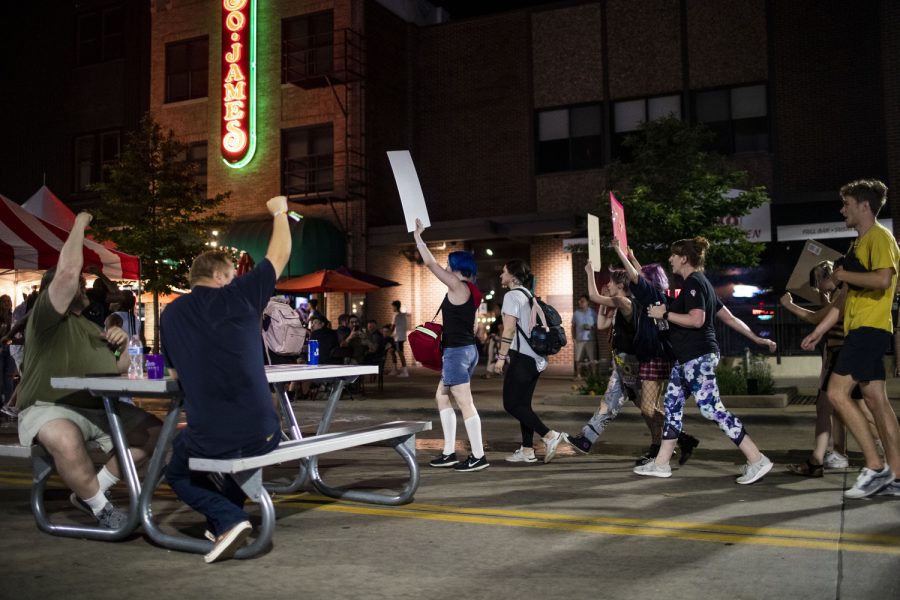Opinion | Showing up is important to activism
Social media has made it easier to promote activist ideals, but the unwillingness to show up for direct action is harmful to the very movements some claim online to be allies of.
Downtown Block Party attendees cheer for protesters during “Night of Rage,” an abortion-rights protest, in Iowa City on Saturday, June 25, 2022. The protest started at the Pentacrest with speakers, then, protesters marched through Iowa City.
July 5, 2022
Two days of protesting and marches were planned and executed in Iowa City following recent Supreme Court decisions, most notably the overturn of Roe v. Wade.
The actions garnered local support from both individuals and organizations. But on Jun. 25, as many Downtown Block Party attendees cheered on the march as we walked down Clinton Street and throughout the Pedestrian Mall, not everyone chose to join in the protest.
Even with more people spreading awareness of justice causes through their social media platforms, organizers and activists have a hard time getting local community members to show up in-person for protests, community conversation, or other forms of action.
When I’ve expressed this view in person, two common responses are repeated from non-organizers. The protest was competing with the Downtown Block Party and people want fun on their Saturday night, some said. The other common response was that perhaps some people needed time to digest the SCOTUS rulings.
There is privilege in being able to step aside and forget politics for an evening. While every self-proclaimed activist should take time for mental and physical self-care, aiming to avoid performative actions should also be a top priority.
Reluctance to “show up” is not only an Iowa City issue nor are there easy answers to this problem. In fact, this issue has garnered such widespread attention that it now has a name: performative activism.
“[Performative activism is the] ability to turn topics and activism into a superficial trend; it makes a mockery out of social issues [while] no tangible action is being taken,” Editor-in-Chief at The Register Forum, Esther Fu, wrote in 2021 as a response to recent performative social justice movements including the social media campaign Blackout Tuesday.
Holding each other accountable is one way to solve the problem of people using movements to either gain social capital or to claim membership when they have no real interest in creating positive, intersectional change.
Sikowis Nobiss, executive director and founder of the Great Plains Action Society, an indigenous-led grassroots organization fighting to prevent further colonial-capitalist violence, expressed their frustration with this seemingly modern standard.
“Everybody needs to make an effort right now,” Nobiss posted on Facebook. “It doesn’t matter what it is, but you better do it. And privileged friends of mine that act woke but don’t show up to s*** can f*** off.”
Nobiss’ comment is one example of how social media can be helpful in organizing. Social media does have its place in modern organizing and is not always harmful. Online platforms allow people to share protest locations and dates, images of recent events or conflicts that occur during protests, as well as debrief — a form of activist mental self-care — following actions.
Change won’t happen in reproductive rights nor in other areas of sociopolitical concern if people keep their opinions behind keyboards and phone screens. With recent SCOTUS decisions and many communities fearing the future standing of other currently held constitutional rights, there will be plenty of opportunities to “hit the streets” in whatever way is most accessible to you.
If you are looking to support reproductive rights and other grassroots movements in Iowa, Repros for Iowa and Corridor Community Action Network (CCAN) are currently hosting 40 Days of Reproductive Freedom. Corridor Community Action Network also regularly posts daily direct action ideas on their platforms.
Donate, vote, show up to a protest, make some calls or send some emails. It doesn’t matter what you do. Do it and do it soon. Time is running out.
Columns reflect the opinions of the authors and are not necessarily those of the Editorial Board, The Daily Iowan, or other organizations in which the author may be involved.














